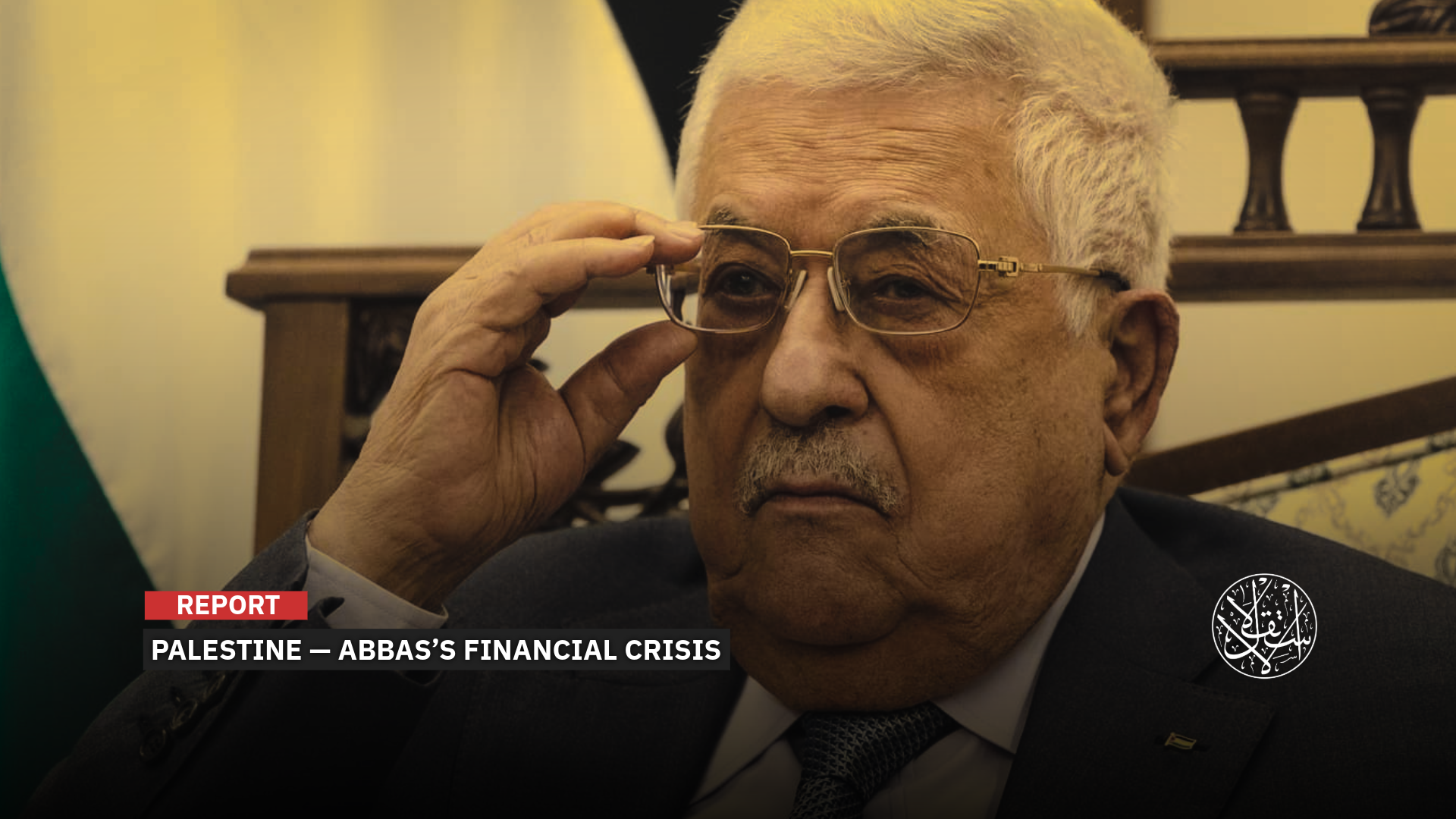Salary Cuts and Shrinking Jobs: Where Is Abbas’s Financial Crisis Headed?

The sharp reduction in employee work hours in the West Bank is meant to ease commuting burdens.
The Palestinian Authority is facing its worst financial crisis since its establishment in 1994, prompting it to take extraordinary measures, including reducing the number of working days for public employees and delaying the payment of their salaries.
The Authority has entered a difficult period of austerity following punitive Israeli Occupation policies, coinciding with Tel Aviv’s ongoing devastating war on the Gaza Strip since October 7, 2023.

What the Crisis Has Unleashed
Before the recent challenges, Palestinian banks ranked among the most profitable financial institutions in the region. Yet this profitability failed to translate into lasting economic growth or generate meaningful improvements in employment and investment opportunities.
On July 29, 2025, the Palestinian government in Ramallah paid 60 percent of salaries to employees earning less than 3,000 shekels (1 USD = 3.41 shekels).
The catch was that the payment was for the month of May, underscoring a deepening financial crisis caused by “Israel’s” withholding of tax revenues it collects on behalf of the Palestinian Authority.
The Ministry of Finance confirmed that the remaining dues owed as of that date belong to employees, whose total number is 153,000, and will be disbursed when resources permit.
It was only on June 4 that the Authority paid the second and final installment of April salaries, calculated at 70 percent.
The Palestinian Authority began deducting portions of public employees’ salaries at the start of 2024, citing a financial crisis triggered by delayed foreign aid and “Israel’s” deduction of part of the tax clearance revenues.
These are import taxes collected by “Israel” at border crossings it controls, which are supposed to be transferred to the Palestinian Authority.
On July 17, the government held an emergency session to discuss what it called the “grave consequences of the continued withholding of clearance funds.” It warned that “essential sectors are at risk of collapse.”
In a statement following the meeting, the government said, “If the current situation continues and the government remains unable to meet its obligations, we may be forced to take the decision to temporarily suspend the work of some official departments and implement a significant reduction in employee workdays.”
The statement added that the total value of withheld funds has exceeded 8.2 billion shekels, and with the addition of two months’ worth of recent clearances, the sum has reached approximately 9.1 billion shekels (2.7 billion USD).
Local unions launched protests and shortened their working days, citing employees’ inability to cover basic living expenses. This prompted the government to officially announce a reduction in official workdays, from five to three per week.
On July 19, the government said the significant reduction in employee attendance is intended to ease commuting burdens while ensuring essential services and protecting national institutions.
Muhammad Abu al-Rub, head of the government communication center, said that since taking office, the government has implemented more than 60 reform measures focused on cutting expenses, eliminating non-essential spending, and channeling financial resources toward vital sectors.
“Salaries have not been regular for many months, which has severely affected our lives and pushed us into hardship,” an employee at a government agency told Al-Estiklal.
“The salary deductions have forced us into debt, and we had to borrow just to meet our monthly obligations.”
“I received an eviction notice for the house I rent with my family because I have been unable to pay rent for a year and a half. My husband, our two children, and I will now be forced to move into my family’s home,” she said, after requesting anonymity for security reasons.
The employee noted that the government does not consider the individual financial circumstances or needs of workers when applying the deductions, adding that the crisis has paralyzed them and impacted the broader economy of the West Bank.

Internal Crisis
Although the financial crisis is largely triggered by Israeli violations, Palestinian economist and businessman Samir Hulileh pointed to additional causes rooted in the mismanagement of public funds.
In an article published in July 2025, he wrote that international aid to the Palestinian Authority’s budget has dropped significantly over the past decade, from around $2 billion annually to approximately $400 million.
According to Hulileh, successive Palestinian governments succeeded in significantly improving domestic revenue, but they have failed to close the growing annual deficit. As a result, they turned to borrowing from local sources, including banks, the pension fund, and the private sector.
He explained that public debt reached $11.8 billion by the end of 2024, amounting to 85.7 percent of the gross domestic product.
Another key issue, he added, lies in the public wage bill, which accounts for about 14 percent of GDP, above the regional average of around 11 percent.
He noted that the most significant factor in rising payroll costs was not an increase in the number of public employees, but rather the continued expansion of allowances and salary bonuses unlinked to performance or job function. These increases, Hulileh said, have not translated into improved government performance, which remains in decline.
The economist argued that despite the Authority’s substantial spending, it has failed to generate sustainable economic growth, investment, or new job opportunities.
He concluded that while addressing these issues would not resolve the crisis entirely, they are medium-term reforms that could prevent the government from falling into a deeper abyss if it continues to rely solely on self-financing.
The article stirred anger within the corridors of the Palestinian Authority and prompted a response from Bassam Zakarneh, head of the Public Services Union and a member of Fatah’s Revolutionary Council.
In a lengthy rebuttal, Zakarneh dismissed the claim that “allowances are granted without justification” as inaccurate, stating that such allowances are either non-existent or insufficient and are only issued in accordance with official regulations.
He refuted Hulileh’s remarks about public sector wages, noting that salaries have not increased since 2014 and that cost-of-living adjustments, required by law, have not been paid.
As a result, he said, the real value of salaries has eroded by as much as 40 percent. He added that “full salaries have not been paid for more than 44 months.”
He went on to explain that employees are now owed over 12 months of full wages and that the government has failed to pay interest on these arrears, effectively causing employees to lose 11 percent of their deferred compensation.
“Employees have been forced to take out loans from banks and pay 11 percent in interest, meaning they lose 22 percent of their entitlements,” Zakarneh said.
He estimated that what is actually being paid amounts to no more than 54 percent of employees’ total compensation. Still, public workers continue to serve their people.
“Yet the budget has shown no signs of financial recovery. So what is the real cause of the deficit?” he asked. “Simply put, it is the Israeli Occupation and the suspension of European and Arab aid, not the allowance of the crushed employee.”
Causes and Consequences
Questions are mounting over Israeli Occupation’s increasingly harsh measures against the Palestinian Authority, and whether they are designed to push it toward collapse, especially in light of “Israel’s” refusal to support its recovery, repair, or reform.
Since the onset of the Israeli aggression on Gaza, the Israeli Occupation has rejected any future role for Mahmoud Abbas’s authority in the besieged territory, accusing it of fostering terrorism.
What makes this pressure particularly notable is its timing. It coincides with “Israel’s” accelerated plans to annex the West Bank, an effort aimed at undercutting any future attempt at “a two-state solution” by seizing more land through expansion and occupation.
On July 23, 2025, the Israeli Knesset endorsed a proposal supporting the annexation of the occupied West Bank and the Jordan Valley, with 71 lawmakers out of 120 voting in favor. Meanwhile, the Israeli Occupation government continues to threaten annexation of parts of Gaza as its genocide presses on.
This comes amid a wave of international recognition of the State of Palestine that began in 2024, when Norway, Spain, and Ireland formally acknowledged Palestinian statehood. France, the United Kingdom, Canada, and several other nations are expected to follow suit during the United Nations General Assembly in New York in September 2025.
Today, more than 140 of the United Nations’ 193 member states officially recognize the State of Palestine, which was declared in exile by Palestinian leaders in 1988.
By contrast, Arab financial support for the Palestinian Authority remains notably absent, despite repeated affirmations that it is the sole legitimate representative of the Palestinian people and that it must be supported to achieve “a two-state solution.”
Muhammad Abu al-Rub, director of the government’s communications center, referred to “positive signals” from several countries applying pressure on “Israel” to release the withheld funds, but said no progress has yet been made.
The crisis, however, has gone beyond frozen funds. In June 2025, Israeli Finance Minister Bezalel Smotrich instructed the Israeli Occupation state comptroller to revoke legal guarantees extended to Israeli banks for working with Palestinian counterparts.
These guarantees were introduced in previous years to shield Israeli banks from potential domestic or international lawsuits that might arise from accusations of transferring funds to parties deemed “hostile.”
With that protection now lifted, Israeli Occupation banks have begun reevaluating their relationships with Palestinian financial institutions, fearing legal exposure.
Israel’s Public Broadcaster reported in June that the decision could potentially destabilize the financial relationship between the two banking systems. It noted that the new directives are expected to cause substantial delays in the transfer of funds from the Palestinian Authority, which would further damage the functioning of its economic institutions.
Israeli media outlets said the move came in response to what they called the Palestinian Authority’s “delegitimization campaign” against the Israeli Occupation in the international arena.
The Middle East Council on Global Affairs warned that the Palestinian Authority’s stability is increasingly fragile amid “Israel’s” latest measures.
In a study published in December 2024, the council wrote, “While Israel has long used economic levers to exert political pressure on the PA, the recent banking crisis augurs something far more profound in its implications.”
It added that the banking system, long seen as one of the few stable foundations in the occupied Palestinian territories, is now under exceptional strain, facing challenges that threaten its very resilience. It is contending with “Israel’s” repeated warnings about severing correspondent banking ties, which are vital for cross-border transactions, along with a host of additional restrictive measures that hamper its daily operations.
These pressures are further compounded by the severe economic and political fallout from the ongoing Israeli war on Gaza, which has disrupted markets, strained liquidity, and deepened uncertainty across the financial landscape.
While the Palestinian Monetary Authority and the World Bank maintain that the sector remains strong, growing pressures indicate that a financial crisis could be approaching.
The Jerusalem Post echoed these concerns, stating in a July 3, 2025, report that “the future of the Palestinian Authority stands at a significantly uncertain point, as it rests on the brink of economic collapse and a possible upcoming change of leadership.”
The report emphasized that the Authority’s handling of the prolonged financial crisis serves as yet another indicator of its instability.
“The PA has been significantly weakened since the start of the Israel-Hamas War, and according to estimates in the security establishment, it is not equipped to take responsibility for the Gaza Strip when the war ends.”
Nevertheless, the Palestinian Authority continues to function, striving to prove its value to “Israel” as an asset rather than a burden, according to the paper.









